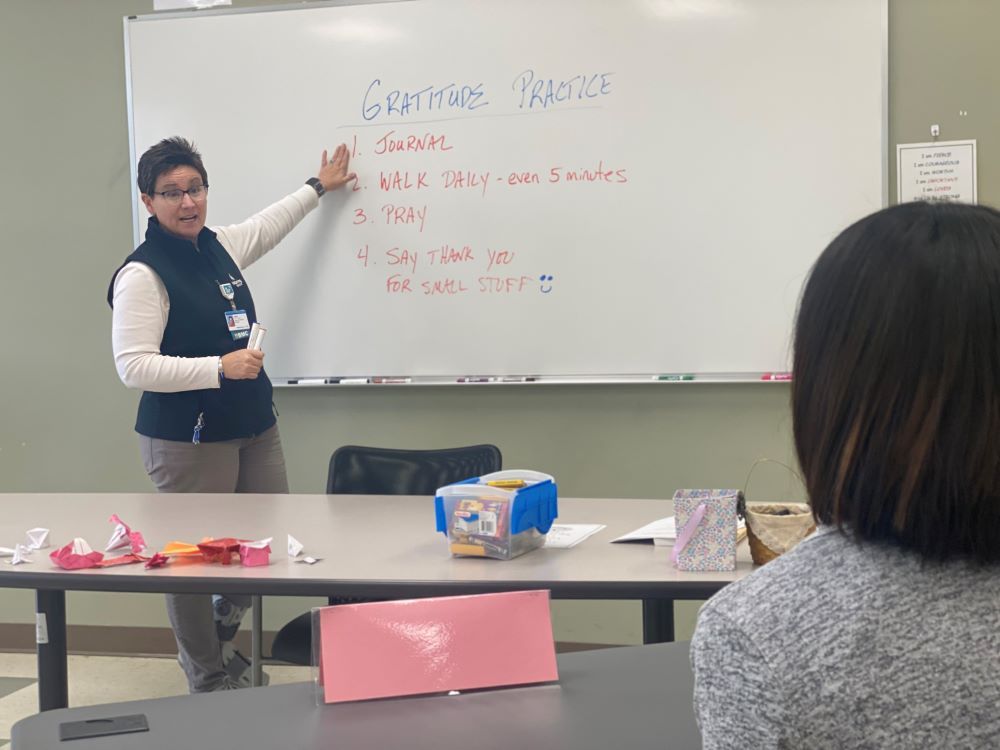Behavioral and Mental Health
Want to learn more about this at Kettering Health?
At a Glance
Q: How does gratitude affect your mind and body?
A: Gratitude can improve mental health and even support heart health. Small daily habits make a big difference.
- Gratitude shifts focus from negative to positive thoughts.
- Builds psychological resilience during tough times.
- Explore easy habits like journaling and mindful reflection.
“What are you grateful for this year?”
This—the unofficial question of Thanksgiving—will be asked in thousands of homes. And between bites of potatoes and turkey, we’ll conjure answers. Some will feel genuine. Others fake and forced, and maybe even hypocritical—just hours before much of America’s mad dash toward holiday shopping and stress.
The contrast leaves many asking a different question: Is gratitude worth the trouble?
Julie Manuel thinks so. “I believe, wholeheartedly, in the power of gratitude,” says the clinical program manager at Kettering Health Behavioral Medical Center.
She’s not alone either. Throughout history, nearly every faith tradition and philosophy has considered gratitude as the “parent virtue.” And, as it turns out, gratitude isn’t just good for your soul. It’s good for your health.
A grateful thought a day . . .
From better sleep and less stress to healthier eating habits, a growing body of research shows that gratitude can improve our health and well-being.
There’s even some evidence to suggest it reduces the risk of heart disease. And while more studies map the connection between gratitude and our physical health, there’s little questioning its benefits for our mental health.
“Gratitude can improve our mental health,” Julie says, “by helping us focus less on negative thoughts and more on positive thinking.”
Even just a moment of gratitude can be powerful. Taking a moment to positively reflect on a person or event can disrupt the negative thinking our minds tend to get stuck in—the low self-esteem, the feelings of worthlessness. And over time, moments of gratitude accumulate, turning a moment into a mindset.
“When our thoughts remain in a constant state of negativity, it impacts everything around us—our relationships, our jobs, our hobbies,” Julie says. “Once we shift our mindset to more positive thinking, we stop the negative cycle.” So much so that it can effectively reduce the severity of symptoms of mental-health disorders, like depression.
Few thoughts are more powerful for our mental health than saying “Thank you,” even—somehow—amid life’s difficulties.
But how?
Be resilient
Julie and other experts refer to this as “resilience.” It’s a kind of psychological grit that staves off becoming overwhelmed by negativity. Gratitude, Julie emphasizes, and the resilience it leads to, doesn’t create a shield from pain or grief. Rather, it changes how our brains process painful events. “It gives you a way to reframe your hurt.”
This reframing, as Julie calls it, helps those who are hurting have eyes to see even the smallest good thing when everything else seems difficult.
Getting there, though, takes more than a question over dinner once a year.
Practice, practice, practice
The benefits of gratitude lie in viewing it less as a momentary feeling of contentment and more as a habit. Something to practice or strengthen, like a muscle. “We have to exercise it daily to make practicing gratitude easier,” Julie says. “We’re building a muscle to flex in times of adversity.”
The key is to keep it simple. “There’s no requirement to have deep, thoughtful insight.” Start with being grateful for the small things that make life easier or more enjoyable. Like your favorite shirt or a friend who texted you today.
Some ways to make a practice of gratitude include
- Keeping a gratitude journal: Write something you’re grateful for every day. Something small. And write it by hand, which engages the parts of your brain connected to memory.
- Going for a gratitude walk: For a few minutes each day, go for a walk, focusing on your breathing and reflecting on something you’re grateful for.
- Beginning and ending with a mindful moment: This could be through prayer or a quiet moment to yourself when you wake up and when you go to bed.
Gratitude is powerful. But it’s no solution for unhealthy habits. Nor is it an alternative to professional care if your negative thoughts or feelings keep you from everyday life. “Gratitude is a tool to help us cope,” Julie says. And while a tool, like a hammer, is useful, if your house is on fire, you don’t need a hammer. You need a hose.
But for life’s comings and goings, gratitude can improve our health, disrupt the negativity, and provide stamina for life’s difficulties. All from finding something small worth celebrating every day—even if it’s a mouthful of turkey.
People Often Ask
Start small: notice everyday positives, keep a handwritten gratitude journal, or take a few mindful minutes reflecting on things you appreciate. Consistency strengthens gratitude like a muscle.
Yes. Regularly practicing gratitude helps reframe challenges, reduces negative thinking, and builds psychological grit to cope with stress and difficult emotions.
Try a gratitude walk, silently acknowledging positives as you move, or take quick mindful pauses during the day to reflect on people or moments you appreciate.
Evidence suggests gratitude may support heart health, lower stress, and improve sleep. Even brief, daily reflections can help reduce the physical effects of chronic stress.
If negative thoughts or feelings interfere with daily life, gratitude alone isn’t enough. Combining it with therapy, counseling, or medical care ensures proper support for mental health.









